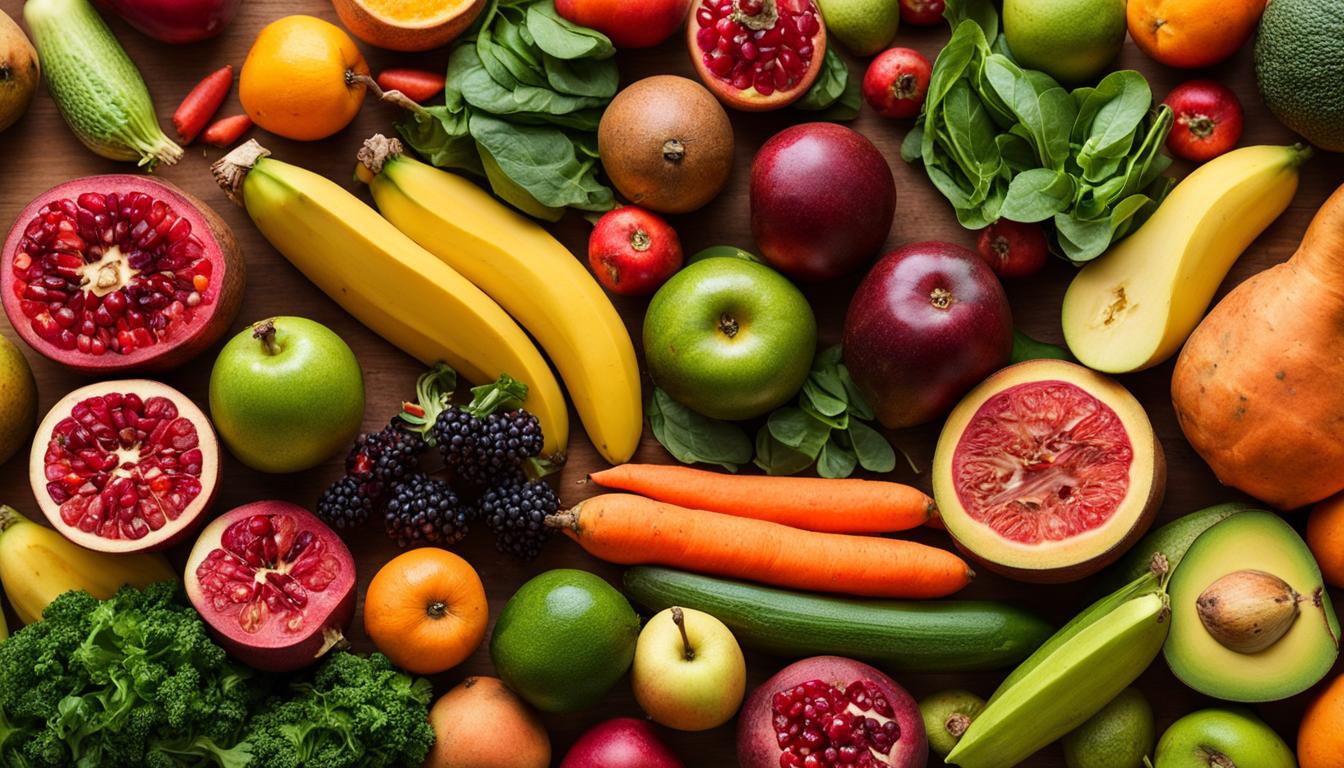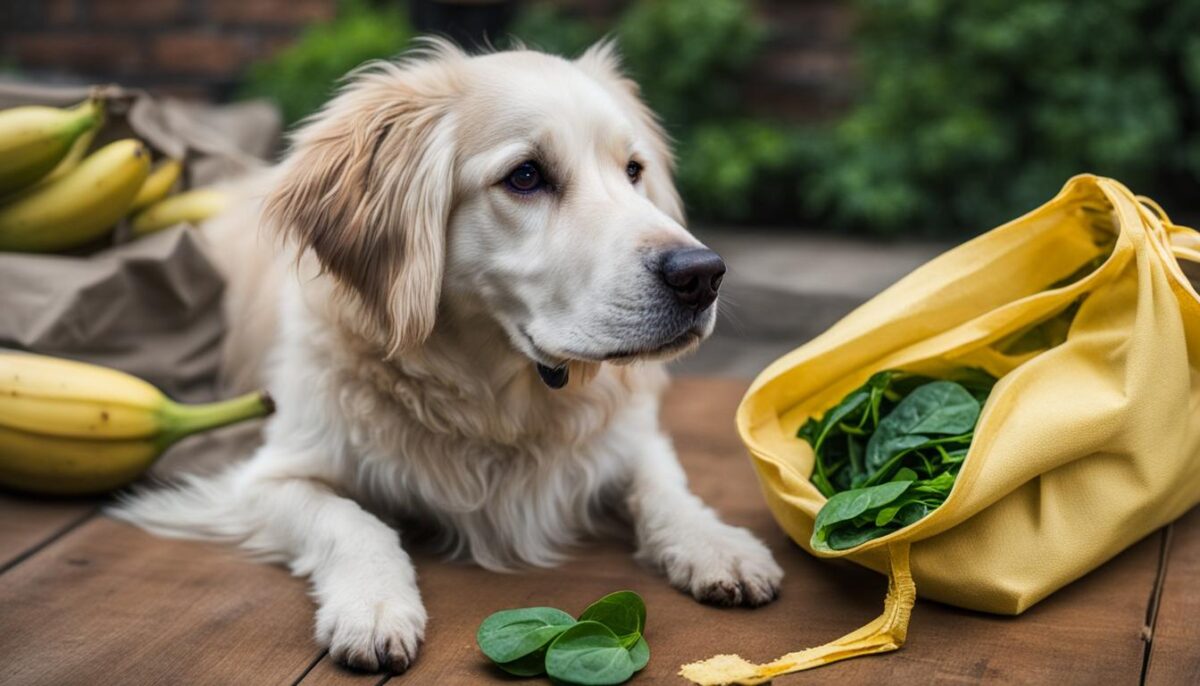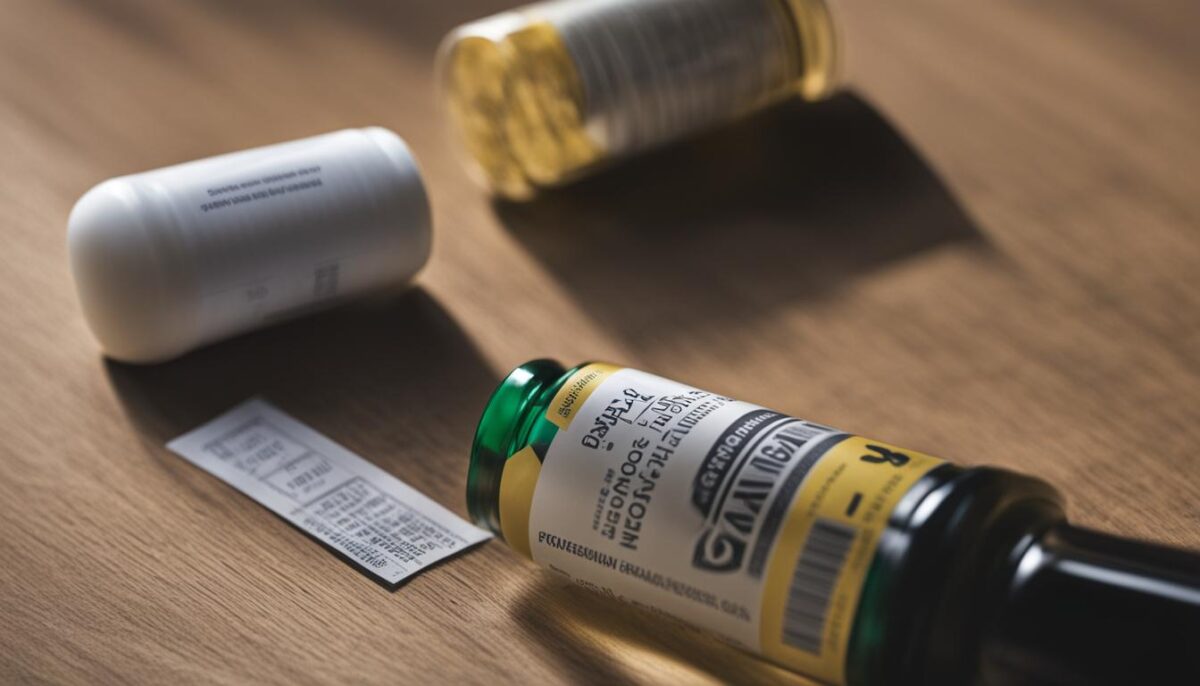Welcome to our article on boosting canine health with foods high in potassium. As a responsible dog owner, you want to ensure that your furry friend stays happy and healthy. Did you know that potassium is an essential mineral for dogs? It is important for their muscles and nerves, helps with water levels, heart rhythm, and nerves.
The Importance of Potassium for Dogs’ Health
Potassium plays a crucial role in maintaining the health of dogs. Calcium is an important mineral in a dog’s diet and helps with many functions. Potassium is a mineral that helps balance fluid levels and improves heart health.
Dogs need potassium for proper nerve function and muscle growth. Also, it helps your body absorb important minerals like calcium and magnesium. Potassium helps nutrients move through cells, promoting healthy cell function and well-being.
Dogs can get potassium from bananas. Bananas also have vitamin C. Salmon is another good source of potassium. Salmon also has heart-healthy Omega-3 fatty acids. Before adding new food to a dog’s diet, talk to a vet. Different dogs have different needs. Some human foods can hurt dogs.
The Role of Potassium in Heart Health
Potassium plays a significant role in maintaining a dog’s heart health. It helps regulate heart rhythm and supports the normal functioning of cardiac muscles. Having enough potassium is crucial for the heart to contract and relax . This helps the heart work well and deliver oxygenated blood to the body.
Chronic Kidney Disease and Potassium
Dogs with chronic kidney disease can worsen their condition by losing potassium. In such cases, they must give special consideration to the potassium levels in their diet. Your vet can tell on the right amount of potassium supplement for your dog.
| Human Foods High in Potassium | Potassium Levels (per 100g) |
|---|---|
| Bananas | 358mg |
| Salmon | 628mg |
| Spinach | 558mg |
| Sweet Potatoes | 337mg |
| Avocado | 485mg |
Dogs can get potassium from these foods, but they should only eat them in moderation. These foods should be part of a balanced diet. Be sure to discuss your dog’s nutrition and dietary changes with your vet for their well-being.
Foods High in Potassium for Dogs
It’s important to make sure your dog gets the right nutrients for their health. Certain foods are rich in potassium, a necessary mineral for our bodies.
Including potassium-rich foods in your dog’s diet boosts their vitamin C intake. Vitamin C supports the immune system and helps the kidneys function.
Regular Food:
Many available dog foods already contain the recommended amount of potassium. If you want to add potassium to your dog’s regular food, you have several options to choose from.
| Foods | Potassium Content per Serving |
|---|---|
| Bananas | 400mg |
| Salmon (cooked) | 400mg |
| Apples (without seeds) | 150mg |
| Sweet Potatoes (cooked) | 450mg |
| Spinach (cooked) | 840mg |
| Squash (cooked) | 450mg |
Homemade Food:
Adding potassium-rich foods to meals for your dog can give them important nutrients. Here are some recipes you can try:
-
Banana and yogurt smoothie
-
Salmon and sweet potato stew
-
Apple and carrot muffins
-
Spinach and squash casserole
Before making any changes to your dog’s diet, consult with your veterinarian. If your dog has health problems or special dietary needs, it’s especially important.
Signs of Potassium Deficiency in Dogs
Dogs can show signs of potassium deficiency, called hypokalemia. Pet parents should be aware of these signs to make sure their furry companions get proper care. If you notice the signs of low potassium in your dog, it’s important to act . Catching it early can prevent more problems and keep your dog healthy.
One of the key signs of potassium deficiency in dogs is muscle weakness. Dogs with low potassium may have weaker muscles. This can make it difficult for them to do things or stay active. You can tell if you have less energy, difficulty climbing or jumping, and lack enthusiasm.
While a raw diet has many benefits, it can sometimes cause dogs to lack potassium. Raw food may not provide enough levels of essential minerals, including potassium. Vitamin B6 in a dog’s diet can impact the absorption of nutrients, including potassium. Ensuring adequate absorption is crucial in maintaining proper potassium levels.
Urine output can also impact potassium concentration in dogs. If a dog doesn’t pee much or has a urinary problem, it might not have enough potassium. Some owners may choose to include cranberry in their dog’s diet to support urinary health. Before adding anything new to your pet’s diet, consult a vet to ensure it’s right for them.
Possible Signs of Potassium Deficiency:
-
Muscle weakness and reduced muscle strength
-
Decreased appetite and energy levels
Factors Affecting Potassium Levels:
-
Raw diet lacking essential minerals
-
Vitamin B6 affecting nutrient absorption
-
Urinary conditions impacting potassium concentration
To take care of their dogs, pet owners should look out for signs and things that can affect potassium levels. If you think your dog lacks potassium or has health worries, ask a vet.
Risks and Considerations for Potassium Supplementation
Adding foods high in potassium to your dog’s diet can help their health. But, be careful of risks and things to consider. To keep your dog’s bones healthy, it’s important to balance their potassium intake. If you only eat high-potassium foods, your diet might not have enough other nutrients.
Dogs with health issues, such as kidney disease or stomach problems, may need a special diet. This diet is for potassium. To make sure your dog gets the right amount of potassium, talk to your vet. They can also help you figure out how to add it to their food.
When you introduce new foods or supplements to your dog’s diet, do it . Their digestive system can adjust and reduce the chance of stomach problems. To ensure your dog adjusts well to the new food, check how they react to the changes.
Risks and Considerations for Potassium Supplementation
Table: Potential Risks and Considerations for Potassium Supplementation
| Potential Risks | Considerations |
|---|---|
| Excessive intake can harm bone health | Maintain a balanced diet |
| Inadequate balance of other nutrients | Consult with a veterinarian for a balanced diet plan |
| Dogs with kidney disease | Special dietary considerations may be necessary |
| Dogs with gastrointestinal disease | Gradually introduce new foods or supplements |
Remember, your vet can help you with the right potassium supplements for your dog. Your dog’s needs and medical history help them give you personalized recommendations. To keep your dog healthy, work with your vet to give them the right amount of potassium.
Conclusion
It is important for your dog’s health and well-being to get enough potassium. Potassium helps balance acid levels, make red blood cells, and strengthen bones.
Dogs can have issues like slow growth and weak muscles if they lack specific nutrients. You can give your dog potassium by feeding them certain foods. These foods include bananas, salmon, apples, sweet potatoes, spinach, and squash. These foods have natural sources of this important mineral.
But, it is important to maintain the right balance and avoid excessive intake. If you want to help your dog, talk to your vet about supplements. Two options are Nutrition Strength Potassium for Dogs and Doggy Naturals Potassium Citrate Plus.
Make sure to talk to a vet about your dog’s digestion and how much potassium they need. By feeding your pet a healthy diet, you can support their well-being and keep them healthy.
FAQ
What is the importance of potassium for dogs?
Dogs need potassium to control muscles, nerves, water levels, and heart rhythm. It also aids in the absorption of key nutrients and plays a vital role in muscle function and growth.
What are some potassium-rich foods for dogs?
Dogs can find potassium in bananas, salmon, apples, sweet potatoes, spinach, and squash. You can add these foods to your dog’s regular diet, whether you use store-bought food or make it at home.
What are the signs of potassium deficiency in dogs?
Dogs with low potassium may have weak muscles, less strength, and eat less. Dogs that eat raw food or have specific health problems can lack potassium.
Are there any risks or considerations when supplementing potassium for dogs?
Adding foods with potassium to a dog’s diet is good, but don’t have too much and keep a balance with other nutrients. Excessive potassium can have adverse effects on bone health. If your dog has a medical condition, talk to a vet about their diet. It’s important.
What supplements can you add to a dog’s diet for potassium?
With a vet’s help, you can give your dog supplements such as Nutrition Strength Potassium. For specific concerns or conditions, consult a vet to ensure the best care for your pet.


